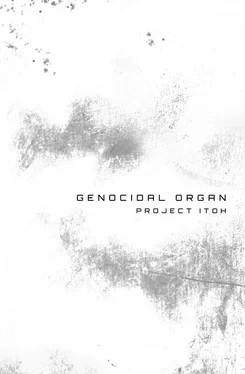Project Itoh - Genocidal Organ
Здесь есть возможность читать онлайн «Project Itoh - Genocidal Organ» весь текст электронной книги совершенно бесплатно (целиком полную версию без сокращений). В некоторых случаях можно слушать аудио, скачать через торрент в формате fb2 и присутствует краткое содержание. Год выпуска: 2012, ISBN: 2012, Издательство: Haikasoru/VIZ Media, Жанр: Старинная литература, на английском языке. Описание произведения, (предисловие) а так же отзывы посетителей доступны на портале библиотеки ЛибКат.
- Название:Genocidal Organ
- Автор:
- Издательство:Haikasoru/VIZ Media
- Жанр:
- Год:2012
- ISBN:9781421550886
- Рейтинг книги:4 / 5. Голосов: 1
-
Избранное:Добавить в избранное
- Отзывы:
-
Ваша оценка:
- 80
- 1
- 2
- 3
- 4
- 5
Genocidal Organ: краткое содержание, описание и аннотация
Предлагаем к чтению аннотацию, описание, краткое содержание или предисловие (зависит от того, что написал сам автор книги «Genocidal Organ»). Если вы не нашли необходимую информацию о книге — напишите в комментариях, мы постараемся отыскать её.
Genocidal Organ — читать онлайн бесплатно полную книгу (весь текст) целиком
Ниже представлен текст книги, разбитый по страницам. Система сохранения места последней прочитанной страницы, позволяет с удобством читать онлайн бесплатно книгу «Genocidal Organ», без необходимости каждый раз заново искать на чём Вы остановились. Поставьте закладку, и сможете в любой момент перейти на страницу, на которой закончили чтение.
Интервал:
Закладка:
It was easy enough, with modern techniques, to perform sensory masking that blocked out feelings, but there were more interesting developments. For example, there was a documented case of a blind subject being able to consistently dodge a tennis ball thrown at him. The subject himself insisted that he was blind, and as far as he was concerned he did indeed live in a world of darkness. And yet the fact was that he was able to register an object coming toward him. In other words, his mind was unable to process the fact that he was seeing the ball in a different channel.
In this instance, there was nothing wrong with the subject’s optic nerves. The reason for the disconnect was that the act of “seeing” something actually consists of two different components. In other words, the ability to see colors and shapes is processed separately from the ability to notice that something is there in front of you.
Yes, to “see” and to “perceive” are different things, processed in different corners of the brain. We might intuitively think of our sense of sight as being primarily related to the senses: “the apple is green,” “the pillar is rectangular,” and so on, but there is actually another part of sight that isn’t so much a sense as a focus, and the eyes constantly send optic information to this part of the brain too.
So even the simple act of looking at something translates into a complicated series of parallel functions for the brain. It was mind-boggling to think how many different combinations of functions could be identified. Five hundred seventy-two and counting, the doctor had said.
“There are something like twenty different substates between the states that we popularly call asleep and awake . So it’s not as if a person has a fixed sense of self. Some modules can be functioning while others are sleeping. And there are times when a person tries to call upon a module only to find it asleep. That’s how we forget or misremember things. Intoxication by alcohol or drugs also falls into this category. Even as we’re speaking now, your and my consciousnesses are—how to say it—fluctuating? There’s no quality control on consciousness. It’s constantly ebbing and flowing from strong to … dilute.”
“A person is ebbing and flowing?” I said.
The doctor explained that we were now heading into the territory of semantics. A person—Descartes’s “I”—could only be understood as a purely linguistic concept these days.
Take a crowd. If ten thousand people gather together in one place, that’s unmistakably a crowd. Same with a thousand, obviously. So what about a hundred? Fifty? Ten people? How many need to be in a group before it can unequivocally be called a crowd?
This was what the doctor had been driving at. “Consciousness,” “I,” “self”—all became a matter of semantics. How many modules needed to be alive before you could describe someone as being the person you knew and loved? How many modules needed to be functioning before you could decide whether they were “conscious”? Society had yet to come up with satisfactory answers.
Take my mother. Was enough of her “alive” in a meaningful sense that I could still call her my mother?
That was the judgment call that I was being asked to make. How on earth was I supposed to give an answer?

So we had our emotions masked along with our senses.
BEAR was about anesthetizing part of yourself. Deliberately diluting your own essence. The domain of conscience was essentially an emotional function of the brain, not a logical one.
“Emotional judgments play a large role in the act of eliminating your battlefield targets,” the counselor said. The screen in front of me was displaying an array of the world’s horrors: natural catastrophes, towns turned into battlefields, hordes of starving children.
“For example, the act of rescuing bloodied victims with your own hands has an overwhelmingly larger impact on your conscience and emotion modules than a more abstract act, such as sending a donation to hurricane victims. It’s stating the obvious to say that people respond more emotionally to what is happening right in front of their eyes. In contrast, the act of donation is essentially a rational one. But even then, emotion is ultimately responsible for many so-called rational decisions, because emotions form the basis of human value judgments. Most logic is really no more than a posteriori rationalization.”
“So you’re saying that when I kill children on the battlefield it’s not the hammer of cold logic but rather my own emotions that are blasting their brains out?” I decided to try and push the counselor’s arguments through to their violent conclusion.
The counselor just nodded as if this were the most natural question in the world. “Emotion has the ability to shortcut logic and deliver a swift, accurate response to stimuli. Even though people are reluctant to admit it, conscience can be just as powerful a driving force as the intent to kill. It might be fashionable to take the view that humans are fundamentally weak and prone to violence. But the fact is that even soldiers such as yourself are in thrall to the driving—and potentially limiting—force of conscience. It doesn’t sit easily alongside your watchwords of ruthlessness and thoroughness. That’s why it becomes imperative to use the technology at our disposal to temporarily subdue this powerful force, particularly with people such as us who were raised in America with its strong moral values. It goes against the grain, but our lives depend on it.”
“So we’re being brainwashed, basically,” I said.
Again the counselor had an answer—well, this was a question he was used to answering, I was sure. His answer began with a nod. “I can see why you think that, but there’s an important difference. With medicines, they say the poison is in the dose, don’t they? You don’t even need to overdose as such in order to abuse medications. Think of people who use tranquilizers as recreational drugs.”
“So it’s not brainwashing because we’re voluntarily submitting to it?”
“Exactly.”
When you entered a battlefield, you needed to be able to kill people with a light heart. If counseling helped in that then surely it was okay? If that was your intention then it should be fine? Were there no ethical problems about subjugating yourself to a process that suppressed your ethical compunctions, even temporarily? I just didn’t know anymore.
There were actually plenty of my teammates who saw the whole counseling process as a farce from the get-go. What right did scientists have to appropriate tactical decision-making from officers who had earned their stripes the hard way? Soldiers signed up for Special Forces with eyes wide open. Why would they need all this girly counseling to firm up their resolve? If they weren’t prepared for what was ahead, they shouldn’t have signed up in the first place. If you can’t stand the heat, get out of the kitchen.
The flip side of the coin was, of course, that Forces provided these counselors for us at great expense because they valued us as soldiers. Or rather they had to value us—public opinion in an advanced capitalist society such as ours had, in the space of a single generation, grown astonishingly intolerant of the idea of any of “our troops” being left to die in foreign climes. It was as if the general public had forgotten the simple fact that, in war, people tend to die. The result of this was that in our military system a soldier became a valuable—and expensive—commodity. Salary, training, the latest technology. Which in turn meant that no standing army could afford to support too many soldiers. So an industry sprang up trying to supply artificial substitutes for human fighters. Most such robotic entities ended up on an ever-growing scrap heap, but a small handful of inventions were granted the honor of a place on the battlefield alongside us human soldiers so that they could help us kill other human soldiers.
Читать дальшеИнтервал:
Закладка:
Похожие книги на «Genocidal Organ»
Представляем Вашему вниманию похожие книги на «Genocidal Organ» списком для выбора. Мы отобрали схожую по названию и смыслу литературу в надежде предоставить читателям больше вариантов отыскать новые, интересные, ещё непрочитанные произведения.
Обсуждение, отзывы о книге «Genocidal Organ» и просто собственные мнения читателей. Оставьте ваши комментарии, напишите, что Вы думаете о произведении, его смысле или главных героях. Укажите что конкретно понравилось, а что нет, и почему Вы так считаете.












